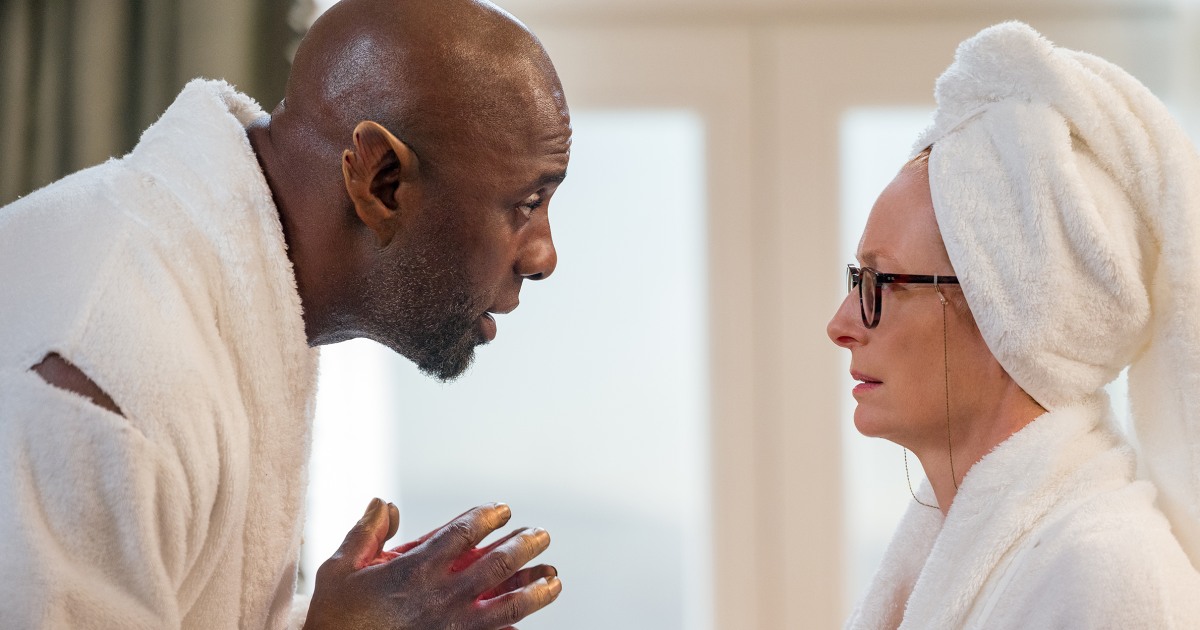
Romance is a story, but it’s also a wish. And as all the stories about genies and bottles make clear, a wish is a kind of trap — not least because it can trap you in a story about desire.
“Three Thousand Years of Longing” is a film about romance and stories and wishes that traps you in the same old historical tropes, only to turn them into smoke before your eyes.
George Miller’s “Three Thousand Years of Longing” is a film about romance and stories and wishes that traps you in the same old historical tropes, only to turn them into smoke before your eyes. It’s a love letter to narrative and to all those who mistrust it.
The movie is based, with some fidelity, on the wonderful A.S. Byatt novella “The Djinn in the Nightingale’s Eye.” The film, like the story, is about Alithea Binnie (Tilda Swinton), a scholar of narratology — the study of stories — who attends a conference in Istanbul. She purchases a souvenir bottle, and when she accidentally removes the stopper in her hotel room, a djinn (Idris Elba) appears. He must grant her three wishes to set himself free. But Alithea, as a student of narrative, has read many, many stories about wishes, and she knows that they always end badly for the wisher.
Alithea’s refusal to wish is also a refusal of desire and therefore of romance. She’s a middle-aged academic who makes a living doing work she enjoys. She likes to travel; she has friends. She married young, and when her husband left her for someone else, she experienced it not as betrayal, but as liberation. The conventional story for women, of romance and love, had trapped her. The true desire of her heart, it turned out, was to abandon that conventional story for something different.
The genie, though, needs her to wish if he’s going to be set free. To persuade her, he tries telling her stories — a pastime of spirits as well as humans. His stories, like Alithea’s, are also all about how love is a trap. The djinn, as he admits, is something of a fool for women’s company and women’s love. He falls for a series of paramours, including the Queen of Sheba (Aamito Lagum) and Zefi (Burcu Gölgedar), a genius inventor hemmed in by expectations.
The djinn claims, based on this extensive experience, that all women want the same thing. Similarly, the promise of romance stories is meant to be universal. Hollywood pushes the rom-com over and over, because who wouldn’t wish to fall in love with someone as sensitive and physically perfect as Idris Elba?
Perhaps “Three Thousand Years of Longing” is trying to show independent Alithea that she, too, wants what all those other longing women wanted. But the djinn’s stories aren’t really about universal desires. His narratives acknowledge, just for starters, that not every man is looking for a woman and not every woman is looking for a man.
The movie uses its nesting-box narrative structure to powerful effect.
The movie uses its nesting-box narrative structure to powerful effect. There’s a romance plot, with its signature meet cute, growing interest, consummation, crisis, reconciliation and happily-ever-after (or happy-for-now).
But at the same time there are all these other stories, which highlight all these other kinds of wishes, wrapped around the central thread. Some are about love that isn’t happy. Some are about how love is a distraction. Some aren’t really about love at all.
And of course, one person can have a range of wishes and a range of stories. Swinton manages to make Alithea both self-sufficient and uncertain — satisfied with her work about stories and seduced by stories about dissatisfaction. She radiates a quiet, practical dreaminess as she falls into a narrative that may or may not be real, depending on how much credibility you give to a djinn or to movies. Is Alithea in love with a person? Or is she in love with a story?
“Three Thousand Years of Longing” can mean one single wish, stretching across millennia, connecting us all. But the movie also shows that years and years of longing can involve many kinds of wishes, from many kinds of people. The film is a mainstream love story, much like the mainstream superhero films that Alithea mentions in her lectures. But it’s simultaneously also sharply at odds with those mainstream stories, an odd indie film that only looks like a Hollywood blockbuster — or is it vice versa? Alithea’s djinn bottles her in everyone else’s story. And it also lets her out, in a rush of smoke, to pursue her own.
Source: | This article originally belongs to Nbcnews.com









